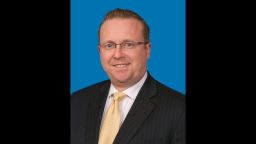Editor’s Note: Jonathan Wackrow is a CNN law enforcement analyst and former agent with the US Secret Service, serving in the presidential protection division. He is a managing director and global head of security at Teneo, a CEO advisory firm. The opinions expressed in this commentary are his. View more opinion on CNN.
On Sunday afternoon, many Americans witnessed President Donald Trump briefly depart the Walter Reed Medical Center, where he was receiving treatment for Covid-19, to wave at the supporters who have been maintaining a constant presence outside the fence line since his arrival at the medical complex on Friday. This motorcade movement, covering less than a mile, has evoked an array of emotions ranging from elation by the President’s supporters to anger from his detractors.

Much of this anger was directed at what was seen as President Trump’s disregard for the safety of the two United States Secret Service Special Agents looking out from behind the ballistic glass of the armored Presidential limo. The agents, wearing medical grade respirator masks and face shields to protect them from infection by their contagious passenger, were vigilantly assessing the environment prepared for any incident that may occur. Many believe that these agents, in the moment, must have been concerned for their own safety.
In reality, that’s a false narrative. United States Secret Service Agents are mission-driven women and men who have dedicated their lives to their protectees, regardless of the personal risk they themselves may face. This is the uncompromising reality that comes with being a Secret Service agent; it is the ethos that drives every agent to ensure that something greater than themselves is protected – the office the Presidency.
But the other reality is that we should never have seen the President and his Secret Service agents in the armored limo on Sunday. We should never have had to wonder if the President is exposing others to a potentially deadly virus. And while personal health and safety currently is never a consideration for agents or officers in a protective detail, the global health crisis raises new questions of whether this prevailing model should still be applicable.
Throughout my career with the United States Secret Service I have witnessed countless situations where agents and officers of the agency executed their mission with little regard for their own safety. From conducting protective missions across active war zones to safeguarding controversial foreign heads of state, the same principles of being an agent have applied in the past as they did on Sunday in that limo: mission first, personal consequence second.
Many have commented to me that the agents should have pushed back on this risk since it was purely for President’s Trump’s political gain. Some have argued with me, going as far to say that they the protective detail should have just said “no” to the President’s request. However, safeguarding the President does not work this way – the Secret Service does not operate on a model of protection by proxy. As agents, they do not have to agree with what the protectees do or like what they say – their mandate is protecting the political leadership of the country.
Now, though, the global rise and destruction brought about by coronavirus has forever changed the threat environment for the Secret Service, with health security dangers to protectees becoming just as serious as physical threats. That’s why I was shocked to witness the President’s visit with supporters on Sunday afternoon. I was stunned not only by what I was witnessing, but also by the potential health consequences for the agents in the vehicle. While knowing full well that the agents were thinking about their immediate mission of protecting the President; I was concerned for their safety given that the potential risk of exposure to the virus was high and that the possible consequences for my former colleagues were significant.
When Secret Service agents and officers are exposed to this virus, whether caused by their protectees or predicated on the environment that they are operating in, the risks are not solely assumed by them but expand to their families, friends, and anyone they may come in contact with.
Get our free weekly newsletter
At least some of this health crisis could have been avoided if there’d been adherence to basic health security policies such as avoiding large gatherings and wearing masks. Had those been observed and encouraged at the highest levels of government, it’s unlikely we’d be in the place we currently find ourselves, with more than 210,000 Americans dead.
Yet this is where we are, and the undertaking of the Secret Service agents whose images were captured for a moment in time on a Sunday afternoon remains unchanged – mission first, personal consequence second.


